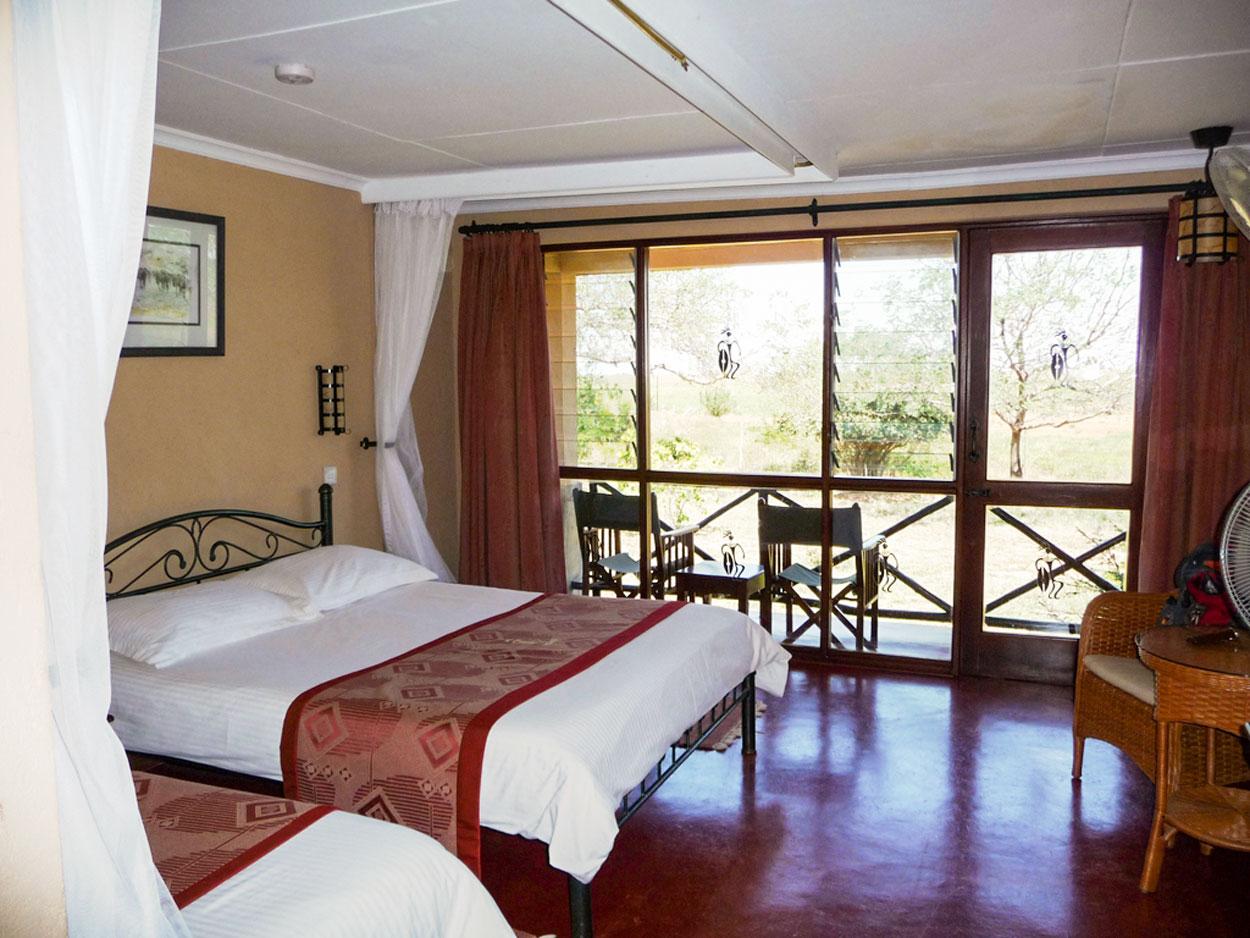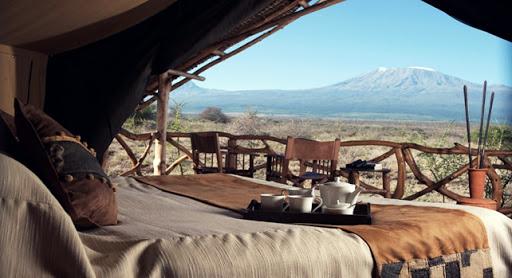TSAVO EAST SAFARI


Explore Summary
-
1
DAY 1: NAIROBI/TSAVO EAST: L, D.
Pick up ex Airport/Hotel/Residence after breakfast. Depart for Tsavo East National Park. Enter the the park through Bachuma gate and game drives en-route to the lode. Arrive, check-in and lunch at your camp/lodge. Afternoon game drives. A vast expanse of unremitting flat savannah plains broken up only by the Yatta plateau lava flow, the Galana river and occasional rocky outcrops. Being of lower altitude than the Western park, Tsavo East is hotter and dryer with bushy grassland, Acacia woodland and riverine forest along the water courses. Most game viewing is concentrated South of the Galana river. Here, large herds of "red elephant" can be found, so called because of the red Laterite soil common to this area. In addition, rhino, lion, leopard, waterbuck, kudu, gerenuk and the rare Hunter's Hartebeest can be seen. Aruba dam provides permanent water and interesting game viewing while the views from Mudanda rock and the Yatta Plateau lava flow are well worth the scramble to the top. Spend 2 nights at the lodge on full board.
-
2
DAY 2: TSAVO EAST: B, L, D.
Full day spent with Morning and afternoon game drives. Tsavo is Kenya's largest national park and comprises two halves, West and East, divided by the main road from Mombasa to Nairobi. The park has historical significance beginning with the building of the "Iron Snake" railway from Mombasa to Uganda over 100 years ago. It was here that the man-eating lions of Tsavo preyed upon the railway workers and held up construction until they were eventually hunted down by Colonel Patterson. The remote Southern part of Tsavo West was the site of several World War 1 battles. More recently in the 1960s and 70s, Tsavo contained enormous numbers of elephant and rhino until poaching took its toll and reduced their presence dramatically. Nowadays, while Tsavo West has outstandingly beautiful landscapes with diverse wildlife habitats, Tsavo East has generally better game viewing as the animals are less spread out. All meals and overnight stay will be at your Lodge/camp.
-
3
DAY 3: TSAVO WEST/MOMBASA: B.
Breakfast at the lodge. Depart for Mombasa. Arrive and transferred to your residence.
Accommodations

ashnil aruba lodge
Ashnil Aruba Lodge is one of the best lodges in the heart ofTsavo East National Park. It's location is superb, 2 hours' drive from the coast of Mombasa and 5 hours drive from Nairobi. Ashnil Aruba Lodge is on the banks of Aruba Dam, built-in 1952 as a sport fishing recreational point in the park. The several watering holes nearby attract wildlife and spotting animals. This is easy because the park lies flat with Savannah grassland. There is a total of 40 deluxe ensuite rooms in the lodge.They have 8 interconnecting doors, 4 triple rooms with one interconnecting room, 6 luxury tents and 2 rooms suited for disabled persons.

satao elerai camp
Satao Elerai Camp is located in a quiet, unspoilt, unique setting on a 5000 acre private conservation area 12 kms south east of Amboseli National Park at the foot of Africa's Largest mountain, Mt Kilimanjaro. The camp looks down onto the Amboseli National Park in one direction and up to Mt Kilimanjaro in the other direction, giving clients what is arguably the best location of any camp in Amboseli. The camp currently has 12 luxury en suite mountain facing tents and 5 large luxurious lodge style suites. Both the tents and the suites are en suite with the suites also having luxurious baths. The facilities are supplied with hot running water provided by eco friendly solar units. The Satao Elerai project is a community project that has been along time in the making. The project has been a concerted effort between the Satao Elerai, The African Wildlife Foundation and The Elerai community. The concept is to provide a sustainable income from tourism for the Masai community in the area and to try and ensure that it is in the communities interest to protect the wildlife for generations to come. Amboseli has been a location where human-wildlife conflict has been an issue for many years, and it is projects like these that can over time ensure that communities start to benefit from wildlife and to ensure they invest in protecting and securing their future for their own benefit.
Extras and Tips
SAFARI TIPS
While planning an East African Safari can seem like a daunting task, it doesn't have to be! Take the stress out of the experience with this helpful summary of the key things you need to think about before you jet off. Once you have all of them covered, you can sit back, relax, and look forward to your safari adventure.
Note: While this is a general guide to vaccinations required for your East African safari, you should always visit your doctor before your departure to obtain the best advice. A pre-trip health check and discussion of what vaccines are necessary for you, as well as how to deal with any unique health concerns, is imperative for a safe and enjoyable safari.
Clothing
On an East African safari, you should go for comfort and convenience when it comes to your clothing. Some of the things you should remember, include:
- Bring lightweight layers in both long and short lengths, plus socks, sleepwear, and swim wear.
- Always take a sweater or fleece jacket, as it can get quite chilly at night and during early mornings.
- Unless you're planning to trek, bulky hiking boots are rarely necessary. However, a comfortable pair of lightweight trainers are a must.
- Don't forget a hat, as you'll want to protect your face and scalp from the equatorial sun.
- It's not recommended to wear bright colors on safari, so consider buying some khaki, dark green, or darker colored clothes before your trip.
Passports & Visas
A full passport with at least six-month validity from the date of departure is generally required for travel. It is recommended that travelers contact the relevant Consulate/Embassy prior to travel for current visa requirements.
Applying for a kenyan Visa
NEW VISA REQUIREMENT: From 01 January 2021 all visitors requiring a visa to enter Kenya will need to apply for an e-visa online, in advance before leaving their country or boarding the aircraft. No Visas will be issued on arrival in Kenya.
Click this link for more information about how to apply: http://evisa.go.ke/evisa.html
$50 USD application fee
Applying for an East African Visa
One of the greatest things to happen to East African tourism over the past few years is the introduction of the East African visa. This visa allows you access to Kenya, Uganda, and Rwanda, and it's not only a time saver, but it also works out considerably cheaper than purchasing individual visas.
To apply for the East African Visa, you'll need the following: A passport with at least six months validity, one standard sized passport photograph, and a completed application form.
Tip: It's important that you apply for the East African visa with the country from which you will begin your travels. The visa will be valid for 90 days from the date marked in your passport.
Cancellation Policy
In the event of written cancellation, the following forfeiture of the programme cost will be assessed based on the number of days prior to programme departure that the cancellation was received:
- 90-60 days prior 20% of the programme cost
- 59-30 days prior 50% of the programme cost
- 29 days or less 100% of the programme cost